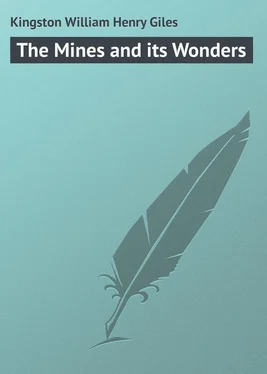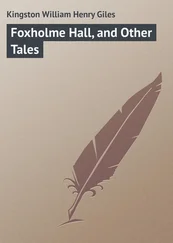William Kingston - The Mines and its Wonders
Здесь есть возможность читать онлайн «William Kingston - The Mines and its Wonders» — ознакомительный отрывок электронной книги совершенно бесплатно, а после прочтения отрывка купить полную версию. В некоторых случаях можно слушать аудио, скачать через торрент в формате fb2 и присутствует краткое содержание. Жанр: foreign_prose, foreign_children, на английском языке. Описание произведения, (предисловие) а так же отзывы посетителей доступны на портале библиотеки ЛибКат.
- Название:The Mines and its Wonders
- Автор:
- Жанр:
- Год:неизвестен
- ISBN:нет данных
- Рейтинг книги:4 / 5. Голосов: 1
-
Избранное:Добавить в избранное
- Отзывы:
-
Ваша оценка:
- 80
- 1
- 2
- 3
- 4
- 5
The Mines and its Wonders: краткое содержание, описание и аннотация
Предлагаем к чтению аннотацию, описание, краткое содержание или предисловие (зависит от того, что написал сам автор книги «The Mines and its Wonders»). Если вы не нашли необходимую информацию о книге — напишите в комментариях, мы постараемся отыскать её.
The Mines and its Wonders — читать онлайн ознакомительный отрывок
Ниже представлен текст книги, разбитый по страницам. Система сохранения места последней прочитанной страницы, позволяет с удобством читать онлайн бесплатно книгу «The Mines and its Wonders», без необходимости каждый раз заново искать на чём Вы остановились. Поставьте закладку, и сможете в любой момент перейти на страницу, на которой закончили чтение.
Интервал:
Закладка:
Little Mark and his mother waited with trembling hearts. Those they longed to see had not appeared, and to their anxious inquiries no satisfactory reply was given. Neither John Gilbart nor his son had been seen. At length, another party came up from the depths, but this time there were five boys borne in the arms of stronger men. Alas! two were motionless – the arms and heads of the others drooped helplessly down. The poor mothers pressed forward – Mark and Mrs Gilbart among them. “That’s Mat – that’s Mat!” cried the child, as one of the first was placed on the ground. The mother, kneeling by the side of the boy, gazed into his face. Too truly she recognised her son, but no responsive glance came from his once bright eyes. “Oh, speak to me – speak to me, Mat,” she exclaimed. There was no reply. She took his hand, it was icy cold. Then she knew that her boy was dead. The doctor came. “I grieve for you, my poor woman; he is past recovery,” he said, and went on to attend to others. Little Mark sat by his dead brother’s side, gazing at him with awe. No one disturbed him. Mrs Gilbart waited on, hope not yet abandoned. More men came up, some fearfully injured. They reported that the rest were in the workings far away – already the mine was on fire, the heat and smoke unbearable – that it was a miracle any had escaped, that all but themselves must have perished. Heartrending were the wailings and shrieks and moanings which arose at this announcement, confirmed by the viewer and overmen. Still many lingered on in the hopes that the corve might be again sent down, but the viewer forbade any to descend, as it must prove their destruction. At length some men came to carry young Gilbart’s corpse to his mother’s cottage. She and Mark followed with tottering steps. The sad truth had forced itself on her that she was a widow – the two bread-winners of her household gone. Still it was some poor consolation to have recovered the body of her son. Many had not that – they were destined never again to see those they loved. More explosions took place, and the report was spread that the whole mine was destroyed. This was, however, not the case. Science enabled the manager to triumph over the fiery element raging below. By completely closing the mouths of the shafts, the atmospheric air was excluded, and the flames extinguished. After nearly three months’ labour, the mine was explored, and the bodies of the dead, scorched and dried to mummies, were recovered. None could be recognised, and they were buried in a common grave. Mrs Gilbart knew that her husband was among them. The pit was again opened. Fresh labourers arrived from other parts, and once more those dark galleries became the scene of active industry. The cottages were required by the fresh comers, and Mrs Gilbart, with her son and her little girl Mary, a year younger than Mark, would have been compelled to go forth houseless and penniless into the cold world, had not an uncle of her late husband, a hewer at a pit a few miles away, offered to receive her and her children into his house. She thankfully went, hoping to maintain herself and others by her needle.
Simon Hayes had been a miner from his boyhood. Though there were some soft places in his heart, he was rough and untutored, and he had many of the faults common among men of his class. He had a wife much like himself in several respects, but he had no children. Though receiving good wages, he had saved nothing, having spent them extravagantly in obtaining luxuries for himself and his wife, for which they cared but little. By refraining from these, he was well able to feed these additional mouths, and for some time his wife made no complaint at his doing so. Still there was nothing saved up for a rainy day. Simon Hayes took mightily to little Mary. There was nothing he thought too good for her; but he showed no affection for Mark. He was a boy doomed to labour as he had been, and the only labour he could think of for him was down in the mine, first as a trapper, then as a putter, and finally as a hewer. Mrs Gilbart shuddered when he alluded to the subject. She had hoped to bring him up to some trade which he could follow above ground, though it would be several years before he would be old enough to be apprenticed. “But he is not very strong, and he is my only one, uncle, you know,” she answered. “Let him go to school first. I have taught him what I could, but he will get on with his learning there faster than at home.”
“What’s the use of learning to a miner?” exclaimed Simon with a gruff laugh. “However, you must have your way, Mary, and I don’t mind paying for his schooling, though, look ye, if times get bad, he’ll have to earn his bread like the rest of us.” Mrs Gilbart thanked her uncle, hoping that the evil day was put off for a long time. Little Mark went to school, and being fond of his books, made rapid progress in reading and writing. He thus soon possessed himself of the key of knowledge. Little Mary was also sent to a girls’ school, and being bright and intelligent, soon became a favourite pupil of the mistress. At length Mrs Hayes fell ill, and her niece’s time was so fully occupied in attending on her, that she could gain nothing by her work. Then there was the doctor to pay. Simon also was laid up for some weeks from a severe bruise by a fall of coal. “I can’t stand this no longer, niece,” he said one day. “The next time I go down the pit I must take Mark with me.” Mrs Gilbart begged hard that her boy might remain above ground. She would take him from school and try to get employment for him on a farm. Simon was obdurate; if she would not agree to his wishes she might leave his house. Her fears were all nonsense, the boy would do well enough in the pit, he would get tenpence a-day as a trapper – on a farm he couldn’t get twopence. Without telling her what he was about to do, the first morning he returned to work he took Mark by the arm and led him along to the pit’s mouth. He had brought a flannel suit. He made the boy put it on. “Now, Mark, we are going into the pit, and you’ll do what I tell you when we get down,” he said, as if it was a matter of course. “I’ve arranged with the manager to take you on from to-day as a trapper. Though you may not like it at first, you’ll soon get accustomed to the work, and so let’s have no nonsense. Here’s the corve all ready to go down – come along.”
Chapter Two.
Learning to Watch
Simon, taking Mark by the hand, stepped on to an iron frame-work or cage, suspended over the pit’s mouth. “Take hold of this bar and don’t move as you value your life, boy,” he said.
Mark obeyed. Several other men and two boys stepped on to the cage, it began to descend. Though little Mark had been hearing of mines all his life, and felt no especial unwillingness, yet all seemed strange about him. It appeared to him by the dim light of the lamps which his uncle and the other men held in their hands, that the shafts were rushing upwards at a fearful rate, while the light of day, which he could still see above him, grew gradually less and less. A giddiness overtook him. He might have fallen, had not his uncle still held him by the shoulder. How long he had been descending he could not tell, when he found the cage come to a stand-still, and that he was down beneath the surface of the earth, a thousand feet or more.
The rumbling of the trains of laden waggons coming to the shafts, the faint voices of the men in the distance, were the only sounds heard, while the lights which flitted here and there only served to make the long vaulted galleries appear more gloomy and dark.
“Come along, Mark!” said his uncle, shouldering his pick and spade, and holding his lantern before him.
As they stepped out of the cage, they found themselves in a gloomy vault, on one side of which a huge furnace was unceasingly roaring, while at the other were the stables in which a number of horses, mules, and donkeys were kept. Before them was the main gallery, about eight feet high and the same wide, arched over with bricks four thick, and extending three miles away from the mouth of the pit. Out of it for its whole length opened shorter galleries or side galleries where the coals were now being won. In all of them rails were laid down for the waggons to run on, and on each side were seams of coal, in some places narrow near the top, in others close to the ground, and in some there was coal from the top to the bottom. At the entrance of these side galleries were doors which had generally to be kept shut, and were only opened when the waggons, loaded with coal or returning empty, had to pass through. After Simon and Mark had proceeded a couple of miles along the main gallery, they stopped at one of these doors. “This is to be your post, Mark,” said Simon.
Читать дальшеИнтервал:
Закладка:
Похожие книги на «The Mines and its Wonders»
Представляем Вашему вниманию похожие книги на «The Mines and its Wonders» списком для выбора. Мы отобрали схожую по названию и смыслу литературу в надежде предоставить читателям больше вариантов отыскать новые, интересные, ещё непрочитанные произведения.
Обсуждение, отзывы о книге «The Mines and its Wonders» и просто собственные мнения читателей. Оставьте ваши комментарии, напишите, что Вы думаете о произведении, его смысле или главных героях. Укажите что конкретно понравилось, а что нет, и почему Вы так считаете.












![Edward Ellis - Adrift on the Pacific - A Boys [sic] Story of the Sea and its Perils](/books/753342/edward-ellis-adrift-on-the-pacific-a-boys-sic-s-thumb.webp)